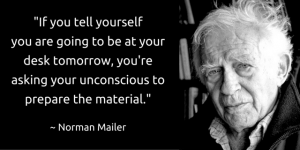 At the Office by Lona O’Connor
At the Office by Lona O’Connor
Don’t tell me all your excuses. I know ’em all. Heck, I’ve used them all myself. When you find yourself falling behind on a goal, you have to learn to combat every excuse with a trick. Remind yourself that excuses are lies. Resolve not to believe them.
Get back on track. Here are some typical excuses and excuse busters aimed at getting you to laugh at your ability to sabotage your better instincts. They will also help you get back on track toward a career goal, revive your abandoned project, or combat general procrastination.
- “I can get it done tomorrow.” Right. Sure you can. Do it today anyway
- “I can do twice as much tomorrow to make up for not doing anything today.” This ugly excuse is based on the fallacy that you have unlimited energy and time. It also presumes that you won’t get hit by a truck tomorrow and be unable to work on your goal for six months.
- “I don’t have time.” You don’t need time. What you need is just half an hour.
- “I’m too far behind; I’ll never catch up.” This is discouragement talking, and it’s particularly insidious because it has a grain of truth. If you’ve stopped working on a task, it does seem that much larger when you face it again. But much of that is distortion based on anxiety and guilt. Start working on it right now and you’ll eventually catch up.
- “I’m scared.” Well, you get points for being honest. But you still don’t get to wiggle out of doing it.
Half an hour. The half-hour is an all-purpose excuse-buster. It is best used for tasks that require chipping away, like filing and cleaning. Rather than committing yourself to a large block of time, which is even more intimidating, just commit to half an hour. If at the end of the half-hour you really don’t want to continue, you can stop. But commit to another half-tomorrow.
For some work, half an hour isn’t enough. For serious brain work, it’s best to commit several hours, more if you can. When I was writing my book, I tried getting up an hour earlier. I did get some work done, but soon became sleep deprived. Then I switched to half-day or whole-day sessions on weekends and found I was much more productive.
Worst first. I’ve mentioned this one many times over the years. There is always some aspect of the job that is scarier than the rest. So sometimes, even though you think you’re working toward a goal, you’re actually working around that one scary task. If you can be honest for one minute, you can identify it: an unpleasant phone call, confronting someone, whatever.
If you do the worst first, you will free up so much anxiety that you will be even more productive after you have done that first, worst task.
Okay, if you are still unmoved by all my positive thinking, lets’ get morbid. Think about somebody you know who died too young. Think of all the things that person missed out on. Then, imagine yourself on your deathbed today. What would you regret not having done? Do it!